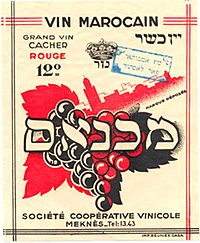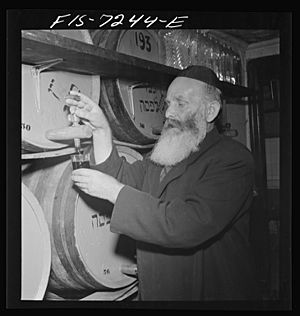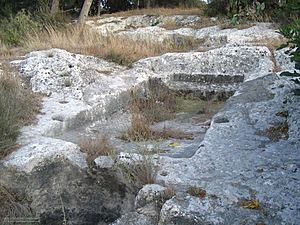Kosher wine facts for kids

Kosher wine label from 1930
|
|
| Halakhic texts relating to this article | |
|---|---|
| Torah: | Deuteronomy 32:38 |
| Mishnah: | Avodah Zarah 29b |
| Babylonian Talmud: | Avodah Zarah 30a |
Kosher wine (Hebrew: יין כשר, yayin kashér) is wine that is produced in accordance with halakha, and more specifically kashrut, such that Jews will be permitted to pronounce blessings over and drink it. This is an important issue, since wine is used in several Jewish ceremonies, especially those of Kiddush.
To be considered kosher, Sabbath-observant Jews must supervise the entire winemaking process and handle much of it in person, from the time the grapes are loaded into the crusher until the finished wine product is bottled and sealed. Additionally, any ingredients used, including finings, must be kosher. Wine that is described as "kosher for Passover" must have been kept free from contact with leavened or fermented grain products, a category that includes many industrial additives and agents.
When kosher wine is produced, marketed, and sold commercially, it would normally have a hechsher (kosher certification mark) issued by a kosher certification agency, or by an authoritative rabbi who is respected and known to be learned in Jewish law, or by the Kashruth Committee working under a beth din (rabbinical court of Judaism).
In recent times, there has been an increased demand for kosher wines, and a number of wine-producing countries now produce a wide variety of sophisticated kosher wines under strict rabbinical supervision, particularly in Israel, the United States, France, Germany, Italy, South Africa, Chile, and Australia. Two of the world's largest producers and importers of kosher wines—Kedem and Manischewitz—are both based in the American Northeast.
History
The use of wine has a long history in Judaism, dating back to biblical times. Archeological evidence shows that wine was produced throughout ancient Israel. The traditional and religious use of wine continued within the Jewish diaspora community. In the United States, kosher wines came to be associated with sweet Concord wines produced by wineries founded by Jewish immigrants to New York.
Beginning in the 1980s, a trend towards producing dry, premium-quality kosher wines began with the revival of the Israeli wine industry. Today kosher wine is produced not only in Israel but throughout the world, including premium wine areas like Napa Valley and the Saint-Émilion region of Bordeaux.
Role of wine in Jewish holidays and rituals
Almost all Jewish holidays, especially the Passover Seder where all present drink four cups of wine, on Purim for the festive meal, and on the Shabbat require obligatory blessings (Kiddush) over filled cups of kosher wine that are then drunk. Grape juice is also suitable on these occasions. If no wine or grape juice is present on Shabbat, the blessing over challah suffices for kiddush on Friday night; for Kiddush on Shabbat morning as well as Havdalah, if there is no wine one would use "Chamar ha-medinah", literally the "drink of the country".

At Jewish marriages, redemptions of first-born other ceremonies, the obligatory blessing of Borei Pri HaGafen ("Blessed are you O Lord, Who created the fruit of the vine") is almost always recited over kosher wine (or grape juice).
According to the teachings of the Midrash, the forbidden fruit that Eve ate and which she gave to Adam was the grape from which wine is derived, though others contest this and say that it was in fact a fig.
Requirements for being kosher
Because of wine's special role in many non-Jewish religions, the kashrut laws specify that wine cannot be considered kosher if it might have been used for idolatry. These laws include prohibitions on Yayin Nesekh (יין נסך – "poured wine"), wine that has been poured to an idol, and Stam Yeynam (סתם יֵינָם), wine that has been touched by someone who believes in idolatry or produced by non-Jews. When kosher wine is yayin mevushal (יין מבושל – "cooked" or "boiled"), it becomes unfit for idolatrous use and will keep the status of kosher wine even if subsequently touched by an idolater.
While none of the ingredients that make up wine (alcohol, sugars, acidity and phenols) is considered non-kosher, the kashrut laws involving wine are concerned more with who handles the wine and what they use to make it. For wine to be considered kosher, only Sabbath-observant Jews may handle it, from the first time in the process when a liquid portion is separated from solid waste, until the wine is pasteurized or bottles are sealed. Wine that is described as "kosher for Passover" must have been kept free from contact with chametz and kitnios. This would include grain, bread, and dough as well as legumes and corn derivatives.


